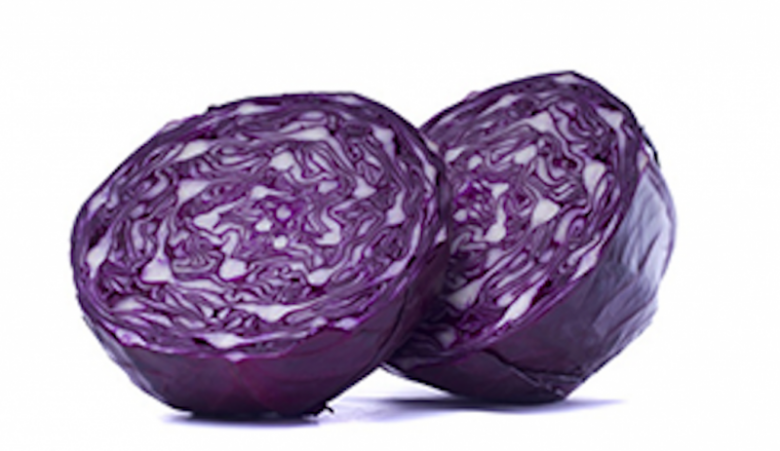by
Stepy —
September 11, 2020
- The health benefits of eating red cabbage are many.
- As a cruciferous vegetable, cabbage doesn’t get as much attention as spinach, kale, or broccoli.
- Cabbage is high on the list when it comes to health benefits.
- It grows in variety of colors including red, blue green, white, pale green to name a few.
- It is popular as the main ingredient in cole slaw, and is also often used in soups.
- Let’s take a look at the health benefits of eating red cabbage.
-
- Antioxidant-rich:
- One of the most important health benefits of eating red cabbage is that it is very high in antioxidants like vitamin A, vitamin C, and polyphenols.
- Antioxidants help fight the effects of oxidative stress.
- According to Dr. Andrew Weil, “Oxidative stress is the total burden placed on organisms by the constant production of free radicals in the normal course of metabolism plus whatever other pressures the environment brings to bear (natural and artificial radiation, toxins in air, food and water; and miscellaneous sources of oxidizing activity, such as tobacco smoke).”
- Oxidative stress is often linked to chronic diseases including heart disease and cancer.
-
- Anti-inflammatory:
- Red cabbage contains compounds called anthocyanins, which are potent anti-inflammatory agents. The other types of cabbage have polyphenol antioxidants that act as anti-inflammatory compounds as well. Chronic inflammation is linked to many serious conditions including cancer.
-
- Cancer prevention:
- Cabbage is a potent cancer fighter. It contains nutrients known as glucosinolates. Upon digestion, these compounds can help to eliminate carcinogens before they damage or alter DNA. It helps prevent healthy cells from converting to malignant cells that lead to cancer. Cruciferous vegetables such as cabbage can prevent lung, breast and prostate cancers.
-
- Digestive tract health:
- Back in 1949, a study was conducted showing rapid healing of peptic ulcers when patients consumed cabbage juice. This research has been well established for years. A more recent study shows that the glucosinolates in cruciferous vegetables may help eradicate excess levels of H. Pylori, a bacteria that may cause gastritis, ulcers, and stomach cancer if levels get too high.
-
- Heart health:
- Including cruciferous vegetables such as Red cabbage in your diet can help prevent cardiovascular disease.
- They protect against heart disease, largely due to their high concentration of vitamin C and beta-carotene. A study conducted by the Department of Epidemiology at Harvard School of Public Health demonstrated a 4-percent lower risk of coronary heart disease as a result of one serving a day of fruits and vegetables. Those that are high in vitamin C, such as cruciferous vegetables, appear to be the most effective. The beta-carotene found in these vegetables decreases the risk of death from cardiovascular disease.
- Stroke:
- Diets rich in cruciferous vegetables may also help reduce the risks of ischemic stroke. According to another study by the Department of Epidemiology, one serving of fruits or vegetables a day can lower the risk of a stroke by 6 percent. Vegetables in the cruciferous family were found to be the most protective, along with green leafy vegetables and citrus fruits.
-
- Weight loss:
- Organic red cabbage is very low in calories, with about 28 per cup, according to Self Nutrition Data. It is also a good source of dietary fiber, with 1.9g per cup, which is 7% of the recommended daily value. Foods that are low in calories and high in fiber are key to weight loss. The fiber makes you feel full faster so you eat less.
- Note: None of the information in our website is intended to diagnose, treat, cure or prevent any illness or disease. The content on our website is for educational purposes only.
- For the health benefits of cruciferous vegetables.
- For the health benefits of arugula.
-
- REFERENCES:
- 1. “Fruit and Vegetable Intake in Relation to Risk of Ischemic Stroke.” National Center for Biotechnology Information. U.S. National Library of Medicine, 06 Oct. 1999. Web. 01 Sep 2014.
- 2. “The Effect of Fruit and Vegetable Intake on Risk for Coronary Heart Disease.” National Center for Biotechnology Information. U.S. National Library of Medicine, Jan. 2001. Web. 01 Sep 2014.
- 3. “RAPID HEALING OF PEPTIC ULCERS IN PATIENTS RECEIVING FRESH CABBAGE JUICE.” National Center for Biotechnology Information. U.S. National Library of Medicine, Jan. 1949. Web. 01 Sep 2014.
- 4. “Brassica Vegetables and Cancer Prevention. Epidemiology and Mechanisms.” National Center for Biotechnology Information. U.S. National Library of Medicine, 1999. Web. 01 Sep 2014.
- 5. “Efficacy of Sulforaphane in Eradicating Helicobacter Pylori in Human Gastric Xenografts Implanted in Nude Mice.” National Center for Biotechnology Information. US National Library of Medicine, Dec. 2003. Web. 01 Sep 2014.


















